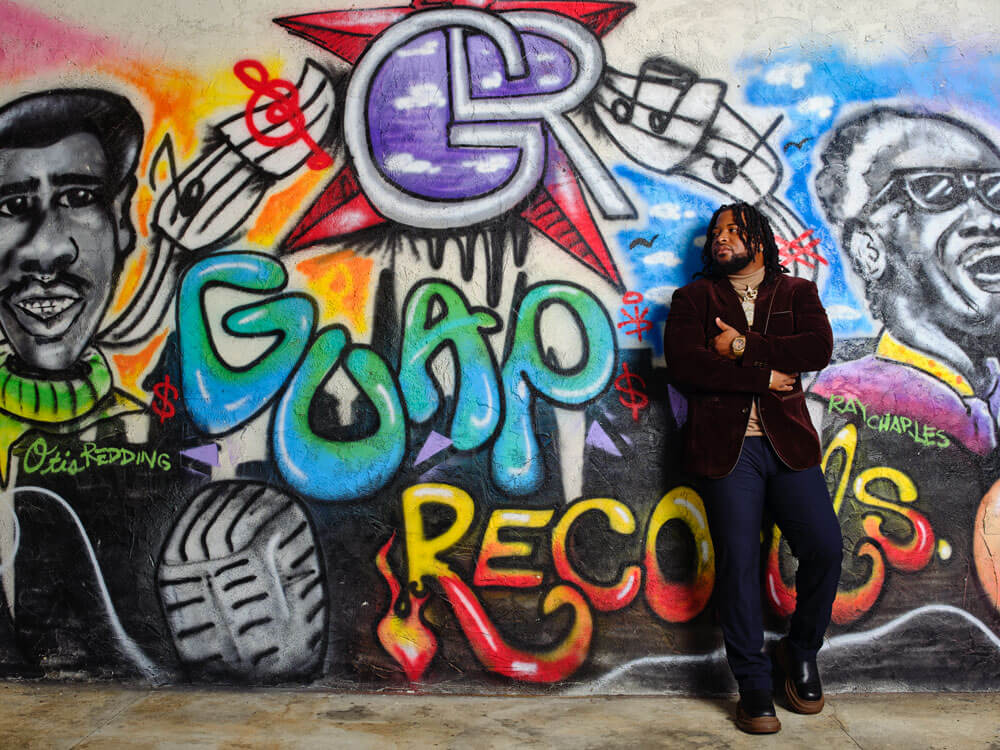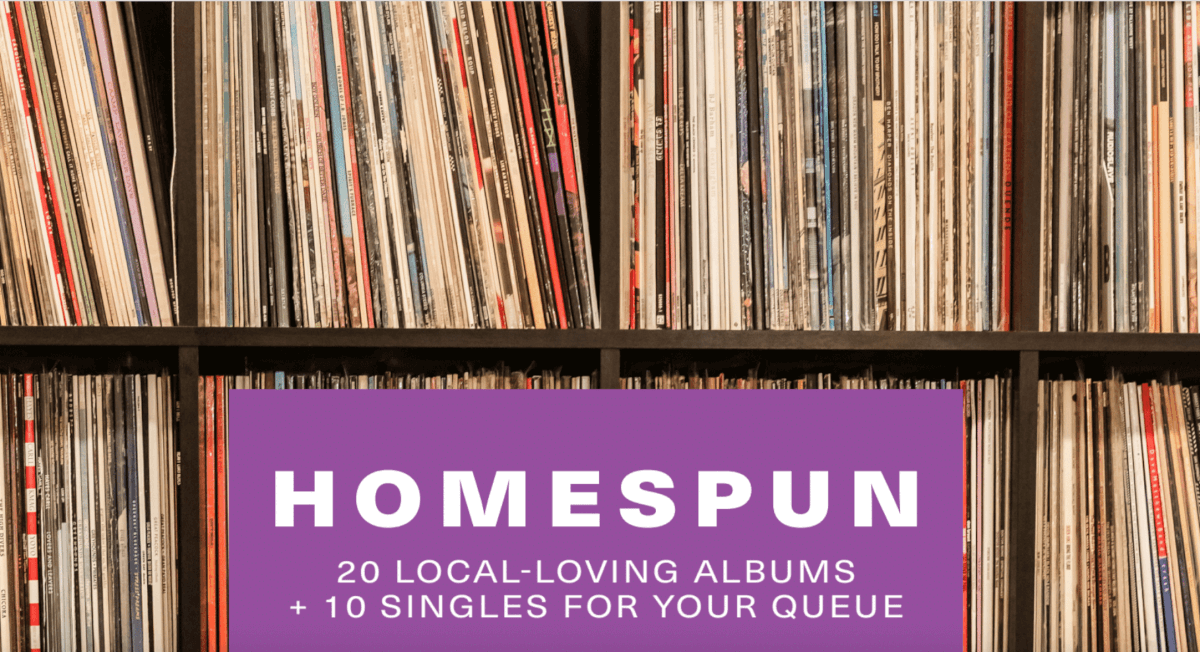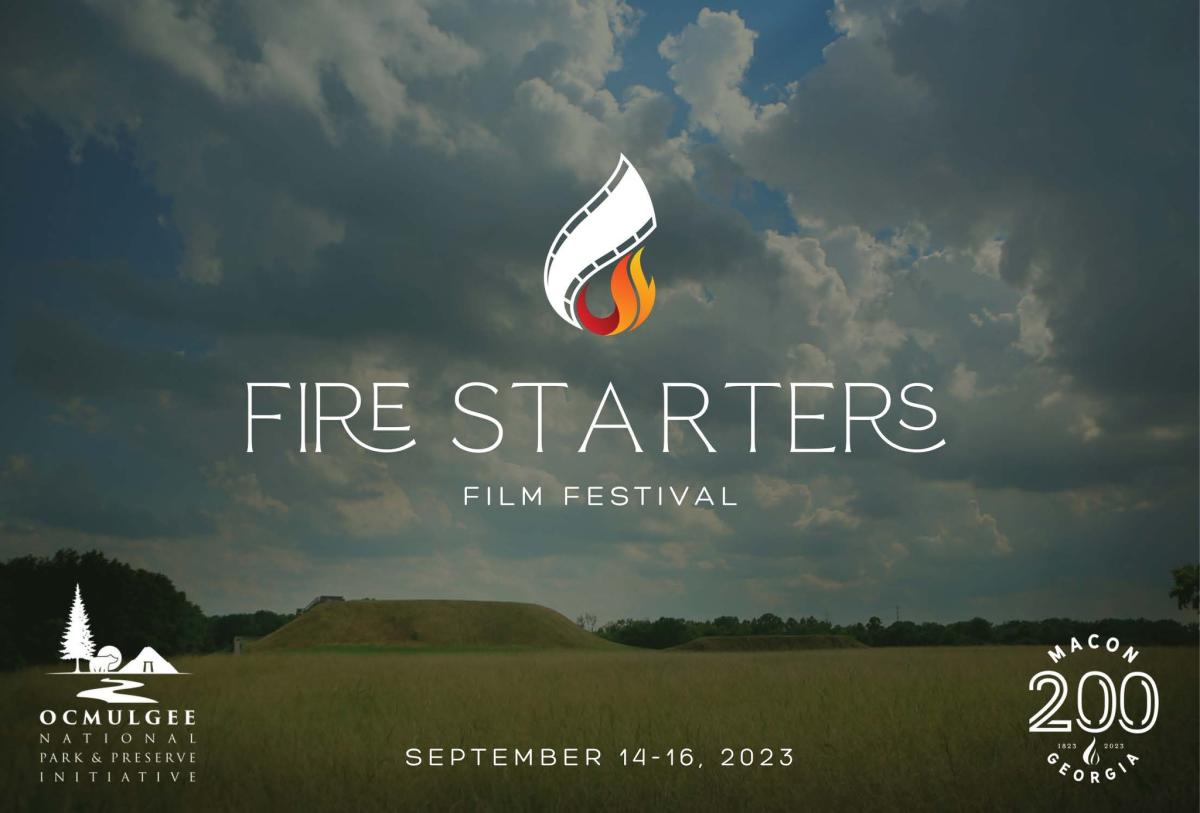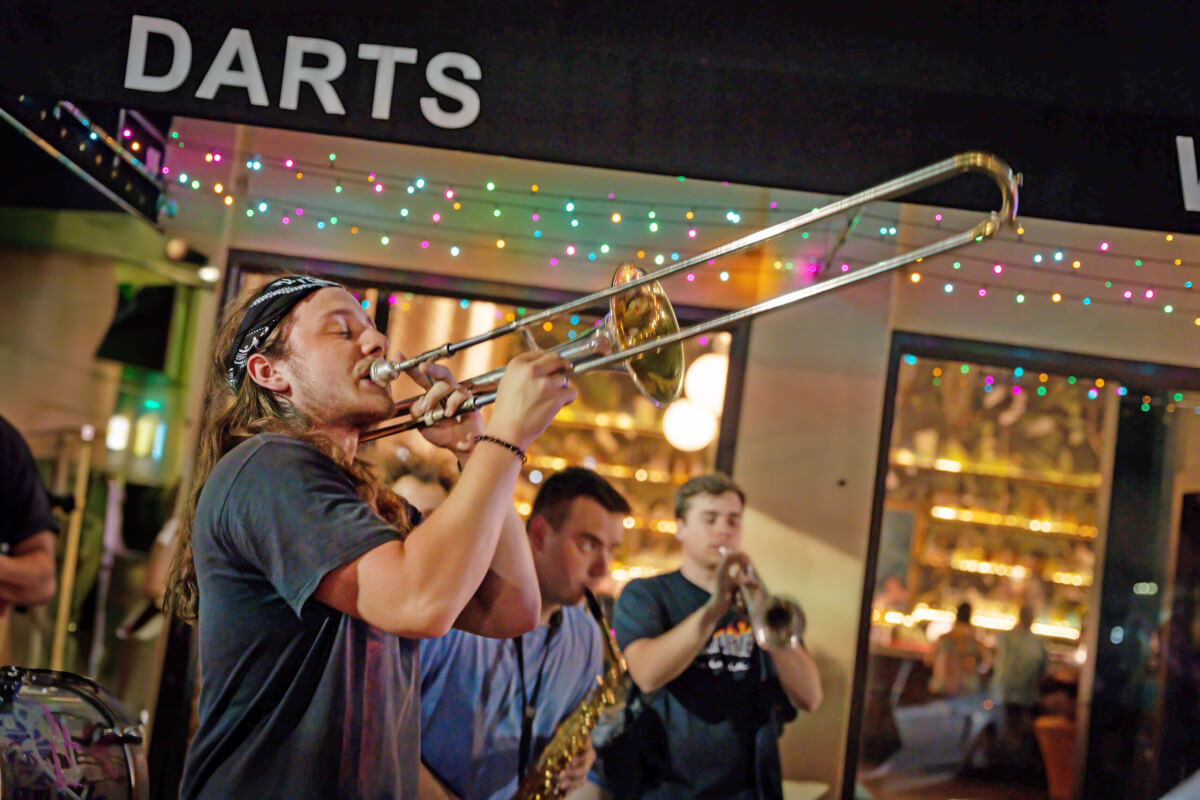
Guap Records
Story by Candice Dyer | Photos by Matt Odom
You no doubt have heard it. The song has become a thumping anthem for Macon: “Rockout.”
On “Rockout,” the artist known as 2win – pronounced “twin” – raps with propulsive, staccato fluency: “I’m going to keep popping it ‘til I make it / came a long way from the Southside of Macon / come through Houston Avenue in a burgundy Chevy…”
Building a breakout star
While serving in the Army, 2win – born Miciahi Kendray McClain – needed something to occupy his mind and express his feelings, he said. He found his outlet in the studio. Soon he started releasing singles and mixtapes. After putting out his first album, “I’m Alright,” in 2019, 2win began building a growing fan base. On Christmas Day that year, he released the “Rockout” single. The public’s enthusiastic response to the song caught the attention of a new Macon company tapping into local talent: Guap Records.
After signing with Guap, 2win recorded the remix to “Rockout” (2021) with Atlanta artist Young Nudy. Today, over 400 radio stations are spinning the remix, and it has racked up more than 6.5 million views on TikTok, almost 2 million views and streams on YouTube, and was among the top 10 most searched songs on the Shazam music service in Atlanta. United Masters is courting 2win for a partnership.
So get ready to hear a lot more references to local landmarks on the radio. 2win is just one of several artists putting Central Georgia – known to kids and audiophiles as “the 478” – on the hip-hop map. “Macon is mic’d up!” he said, crediting the nurturing, high-energy visionaries at Guap Records.
“Guap saved me, man, saved my life,” 2win said. “If it weren’t for them, and their amount of knowledge, I don’t know where I’d be. They believe in you, so you have no choice but to grow and learn. It’s a beautiful thing. It’s the best, what Guap is doing. I didn’t really take my rapping seriously until they believed in me, and now I’ve gone from ‘local rapper’ to ‘star.’”
The Guap lineup
It’s all in a day’s work for Guap Records, a consortium of friends in their 30s pursuing some big dreams and taking as many local artists with them as they can wrangle. Most of them grew up together, calling themselves the “guapmores” because of their handsomeness, and later truncating that to just “guap.” Guap colloquially means “money” (usually in the stacks-of-cash form); this meaning originated with East Coast rap and may have had its roots in the Spanish “guapo” for handsome (think “pretty penny”). Nowadays, it’s common parlance for hip-hop lovers.
With 15 staff members across four recording studios, the company handles artist management as well as bookings. Guap specializes in hip-hop, but not exclusively. They also have R&B artist T. Royal and soul singer Mike Clark in their stable. Guap is also in the process of building a spacious venue for performances and a wide range of community events.
The company is owned by Bud Dupree, Atlanta Falcons linebacker and philanthropist who has not forgotten where he grew up. “There is so much talent in Middle Georgia, so many resources,” he said. “This all started simply enough as a way to give opportunities to my friends, to help them succeed, to lift them up, and help them achieve some major goals.”
Ray Wilson, the president, said “Bud could’ve used his success to fly around the world. But he wanted to give back. It takes money to make money. We’re investing not just money but time and knowledge in our community, and in the process, we’re spreading the love for Macon; we’re putting Macon in the spotlight – all while we’re giving voice to the voiceless, which is what this is all about.”
Snap Hughes, also known as Snap Wordlaw, is the hard-working, fast-talking “captain” on the ground at Guap, doing everything from A&R (Artists & Repertoire, also known as talent scouting) to posting flyers around town for events. He grew up with Dupree in Wilkinson County. “We hung out together at a juke joint called Chocolate City. Anybody who partied back in the day remembers Chocolate City because that was the biggest party going,” says Hughes, who describes himself as a “music geek from way on back.”
Like 2win, he served in the Army. He was injured in Iraq before retiring and devoting himself to music full time. “My influences were always local artists such as Ferrari B, Trouble Ga slum, J Hugh, Black flame, Suspect Hardboi, B Jizzle, and Yung R,” he says. “Mainstream artists Gucci Mane, Pastor Troy, Yo Gotti, and Plies played an important role to my love for music.”
His first mixtape, Wordlaw Vol. 1, featured the hit “Wet Flo Sign,” which was streamed more than 100,000 times. “My love for writing music came after witnessing my grandmother pass away,” Hughes says. “That unlocked a gift of writing.” To date, he has written more than 60 songs and hooks for artists all across Central Georgia, and he does not plan on stopping any time soon.
A sense of place
As music goes, hip-hop is still relatively young at only fifty years old. To put it in perspective for older Maconites, when Duane Allman was bending notes on his guitar, the deejays in the Bronx were just starting to drop beats by putting a needle in the groove. Guap Records represents a trend in grassroots music production, says Toby S. Jenkins, author of “The Hip-Hop Mindset: Success Strategies for Educators and Other Professionals.”
“Several companies have opened up striking distance from Atlanta, which is the mecca,” she says. “But Southerners, who can see cultural and geographic differences, know that there is a different ‘feel’ from town to town, that what is hot in Macon is different from what is popular in Memphis. There is a lot of value put on the unique way you express yourself in your neck of the woods.”
A sense of place is important in hip-hop. Hughes explained, “They come to us from everywhere from Sparta and Roberta to Milledgeville and Dublin. Then in Macon we have the neighborhoods with different identities, like the East Side and Pleasant Hill.” But there are no beefs or turf wars in the hip-hop crowd, he noted, just bone-deep community pride.
Guap Records is headquartered at 325 Edgewood Lane in Macon’s Greenwood Bottom district, and more specifically in an area once known as Tybee; these place names alone are a legacy that affect the feel of the music made there. Greenwood Bottom’s name is an homage to Greenwood in Tulsa, Oklahoma, the site of the 1921 Black Wall Street massacre during which hundreds of people were killed when a white mob attacked the thriving Black business district and burned it to the ground. The now-demolished Tybee community was named for Tybee Island, Georgia, which was a post-Middle-Passage waypoint where enslaved Africans were held before being taken to further inland slave markets, such as the one in Macon on Cotton Avenue. Historic Macon Foundation recently published an article called “Tybee: The Consequences of Urban Renewal on a Macon Community,” detailing how “the 31 acres of Tybee that were condemned and appropriated for “urban renewal” are now peppered with vacant lots, blighted structures, and industrial buildings,” though they once housed a thriving Black community.
Greenwood Bottom houses structures like The Roxy Theater, which opened on Hazel Street in 1949 as a venue for Black patrons during the Jim Crow era. It sits just four blocks away from where Guap now stands. The Roxy Theater is currently listed on Historic Macon’s Fading Five, a collection of endangered places, and has been nominated for inclusion on the National Register of Historic Places. The coal tower near the studio was once surrounded by Tybee Homes. When Guap executives chose the studio’s location, they weren’t yet aware of this history, but as they’ve embraced their connection to Middle Georgia’s cultural and music legacy, they believe it was all meant to be.
Hughes shared, “I believe in the power of the universe, like God has everything in place for a reason, so for us to be located right now in Greenwood Bottom — the significance of it, the event that happened in Tulsa, Oklahoma, like, Black Wall Street — with Macon becoming his own little mini Black Wall Street when you look at downtown with so many Black-owned businesses flourishing, it’s just dope for us to be right down there in the mix of it on Edgewood.” And of Tybee: “We’re building our brand and our business right here, where our people used to be at, used to flourish, so that’s how we know it can work, and just do it, and grow right here in Middle Georgia, in the 478.”
Wes Stroud, a community leader and driving force behind revitalization efforts in Greenwood Bottom, agreed with Hughes. “From the Douglass Theater to Guap Records, MLK Boulevard and the history of Greenwood Bottom and Tybee are so vital to Macon’s music history, that it only makes sense Guap would find a home in the community. The proximity of Guap Records to The Roxy Theater places it not only in a great physical location but also an amazing cultural location. Watching a small Black-owned record label lay roots in a community and grow with the city is amazing. To watch people from the community, recommit to the community, makes the story of Guap Records a testament to the phrase ‘for us, by us.’ Seeing the label get so involved in positive outreach assures me that they are seriously committed to the culture of Macon and the Middle Georgia area.”
“Your upbringing and your hometown shapes a lot of who you are,” Hughes philosophized. “Different places put values on different things. Me being from the country, respect is a big value. You want to do good business because I’m used to being around people who know me, people who know where I live, who know who my family is, versus being from the big city where you can get away with a lot more because it’s so many people … I came up in Deadwood, and I’ll always be from Deadwood. But Macon is my second home. They adopted Guap, and embraced us in everything we do. And Macon will always have our support. The 478 – that’s what made me, that’s what I stand on. That’s why our studio is here, that’s why I live here, that’s why our brand is here.”
Guap Records focuses on community renewal and mentorships, Hughes continued, “not necessarily for us, in race, but it’s for us as a people, as a community of Middle Georgia. Because Middle Georgia is one of the most powerful music places in the world. And it’s up to us to know our history and rewrite our history. And we’re doing it, and we’re blessed to be good at it.”
The evolution of the 478’s sound
While Macon is cranking out breakout acts – Baby Jungle reports he’s also negotiating a distribution deal – it does not really have a singular hip-hop “sound.” Think of it more as a choir of different voices, with plenty of highly individualized freestyling. “There’s too much diversity in our artists for there to be just one sound,” Hughes said. Moreover, Guap is more than just a feeder system for the alpha-dogs in Atlanta.
“We are our own world,” Hughes said. “We are on pace to become a powerhouse name right here in Middle Georgia. We want to help put the 478 on the map. The 478 has so much talent it is just crazy! The difference I see in Macon and Atlanta is Atlanta is the hip-hop capital of the world right now, and it’s amazing. But…when you speak names like Otis Redding and Little Richard…I mean, we love Atlanta. They show us a lot of love. But we’re our own thing.”
Hughes presides over a scene of bustling creative fermentation. He organizes “cyphers,” which are a little like guitar pulls or songwriters-in-the-round events. “We gather all the top talents from the 478, put them in the studio, and record a freestyle over a beat,” he says. “[The cypher project was] created by me and shot by BP, a cameraman from Macon who created the Virtual Platform, Macon Mic Up. We film at different locations throughout the city.”
The end result? “The reason behind it is to bring out all talents from different parts of the 478 and have them on one song. Through doing it we hope to create new bonds and make artists come together and work with each other and collaborate more. There is a lot of unity in our scene, a lot of love. People support each other.”
Getting guap – the business side
Guap does more than just record; it also incubates. Hughes sometimes works pro bono with up-and-coming artists and sound engineers. He often finds himself schooling some of the younger ones. “They may know ‘Dock of the Bay,’ but some of them don’t know much about Otis Redding, who was a smart businessman as well as singer. So I encourage them to learn about local history and sample from some of our homegrown greats. I encourage them to be professional, to return phone calls and emails and handle the business end wisely.”
Anthony Parker is a well-respected label consultant who goes by “Big Amp.” He said, “there’s a problem in hip-hop with what we call ‘giving a person flowers,’ meaning [we don’t give] accolades that acknowledge accomplishments. But you don’t find that with Guap. They are real big on teaching. They use mentoring and internships and shadowing, and you don’t always find that in hip-hop. What they are doing is providing hope. They have a CEO who made it, and they are opening their doors to youth. It would’ve been easy for them to run to Atlanta, but they stayed home and started cultivating their own backyard. When I pop in at Guap and do a meet-and-greet, Snap makes sure everyone is using proper etiquette, that everyone is professional. That’s something that is missing in a lot of places. I think Guap is off to a great start.”
Personal growth is a happy side effect of business mentorship, Hughes said. But that “side effect” has a massive impact. By starting professional email account for artists and mentoring them in all the financial aspects of the trade, Hughes and the other Guap visionaries don’t just let artists create music and distribute it; they teach each artists to be a business – and to always be about their business. That brings capital to Greenwood Bottom and the rest of Macon and Central Georgia. Their personal growth becomes a key aspect of economic revitalization for their community.
To reward all of this talent and give it a chance to glam up and shine, Guap Records has launched The 478 Awards, which sold out the Grand Opera House last year for a black-tie, red-carpet event. “We’re making that an annual thing,” Hughes says.
The company is in the dream business, so what are the guapmores’ fantasies for the future? Platinum records, Grammys, BET Awards. “We want to be the biggest indie label in the South,” said Dupree, and his company’s track record so far makes industry watchers take those aspirations seriously.
Why?
“Music, man,” says Hughes. “It’s the most powerful tool in the world for uniting people. Music don’t got a race or a color. It brings together Black, white, and Chinese. It can make that old, racist way of thinking die. It can change lives.”
Published in the June/July 2023 Music Issue.







